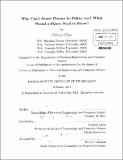| dc.contributor.advisor | Randall Davis. | en_US |
| dc.contributor.author | Chao, Chih-yu, Ph. D. Massachusetts Institute of Technology | en_US |
| dc.contributor.other | Massachusetts Institute of Technology. Dept. of Electrical Engineering and Computer Science. | en_US |
| dc.date.accessioned | 2011-05-23T18:12:02Z | |
| dc.date.available | 2011-05-23T18:12:02Z | |
| dc.date.copyright | 2011 | en_US |
| dc.date.issued | 2011 | en_US |
| dc.identifier.uri | http://hdl.handle.net/1721.1/63066 | |
| dc.description | Thesis (Ph. D.)--Massachusetts Institute of Technology, Dept. of Electrical Engineering and Computer Science, 2011. | en_US |
| dc.description | Cataloged from PDF version of thesis. | en_US |
| dc.description | Includes bibliographical references (p. 109-114). | en_US |
| dc.description.abstract | Mobile devices nowadays contain state-of-the-art technologies and are considered "smart". However, we and others around us are often interrupted or embarrassed by these smart devices because the calls and messages received by the devices are not always presented to us at the right moment with the appropriate modality. Our work investigates what information a device like this needs to know, and how the device should make use of such information in order to behave "politely". We began by investigating the human definition of "politeness" in the context of handling voice calls and text messages, and we found the common properties shared by the scenarios where a device is expected to behave politely. Next, we built a rulebased decision-making system that infers user interruptability and decides when and how the device should interrupt the user. We then determined whether the vocabulary defined in our rule set has captured general users' definition of a polite device. We also determined that users were able to understand the system's vocabulary and customize the rule set for their own needs. To further accommodate individual users' needs, we created a debugging interface that allows users to explore the rule set and modify the rules when the device "misbehaves". After that, we identified two major challenges in debugging: user's willingness to debug, displaying the structure of the rule set on a small screen real estate. Lastly, we pointed out the aspects that can be investigated in the future to improve our current work, including: augmenting the vocabulary when more signals become available, considering users of different use habits and cultural backgrounds, and designing a better interface that addresses the challenges in debugging. | en_US |
| dc.description.statementofresponsibility | by Chih-yu Chao. | en_US |
| dc.format.extent | 114 p. | en_US |
| dc.language.iso | eng | en_US |
| dc.publisher | Massachusetts Institute of Technology | en_US |
| dc.rights | M.I.T. theses are protected by
copyright. They may be viewed from this source for any purpose, but
reproduction or distribution in any format is prohibited without written
permission. See provided URL for inquiries about permission. | en_US |
| dc.rights.uri | http://dspace.mit.edu/handle/1721.1/7582 | en_US |
| dc.subject | Electrical Engineering and Computer Science. | en_US |
| dc.title | Why can't smart phones be polite, too? : what would a phone need to know? | en_US |
| dc.type | Thesis | en_US |
| dc.description.degree | Ph.D. | en_US |
| dc.contributor.department | Massachusetts Institute of Technology. Department of Electrical Engineering and Computer Science | |
| dc.identifier.oclc | 725617609 | en_US |
